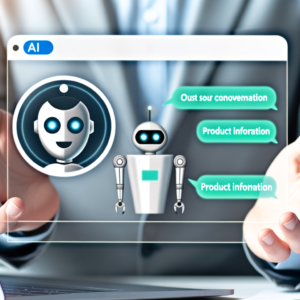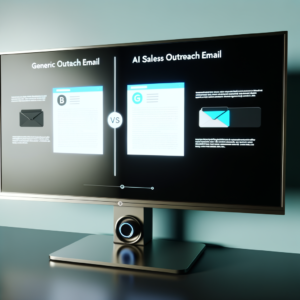Unlocking Growth: How AI Can Supercharge Your Small Business
In today’s fast-paced business landscape, small business owners often find themselves wearing multiple hats, juggling countless tasks, and struggling to find enough hours in the day. But what if I told you there’s a way to multiply your productivity, enhance your decision-making, and free up time for strategic thinking? Enter Artificial Intelligence (AI) – the game-changer that’s no longer reserved for tech giants and Fortune 500 companies.
As a veteran of the tech industry with over three decades of experience at powerhouses like Microsoft and Amazon, I’ve witnessed firsthand the transformative power of AI. Now, as the founder of AIA Copilot, I’m on a mission to bring that power to small businesses like yours. Let’s dive into how AI can supercharge your operations, focusing on three key areas: marketing, customer service, and sales.
AI in Marketing: Precision Targeting and Personalization
Gone are the days of spray-and-pray marketing tactics. AI is revolutionizing how small businesses approach marketing, allowing for unprecedented levels of targeting and personalization.
1. Customer Segmentation on Steroids

AI algorithms can analyze vast amounts of customer data – from purchase history to browsing behavior – to create hyper-specific customer segments. This level of granularity allows you to tailor your marketing messages with laser precision.
Pro Tip: Start small. Use AI to segment your email list based on past purchase behavior and watch your open rates soar.
2. Content Creation and Optimization
AI tools can now generate blog posts, social media content, and even video scripts. While they can’t replace human creativity entirely, they can significantly speed up your content production process.
Case Study: Consider a small e-commerce business that implemented AI to generate product descriptions. Hypothetically, such a business might see significant benefits, such as a 40% reduction in content creation time and a 15% increase in organic search traffic. This example illustrates how AI can potentially streamline operations and improve visibility for online retailers.
Think About This: How much time do you currently spend on content creation? Imagine cutting that time in half while improving your results.
3. Predictive Analytics for Campaign Planning
AI can analyze historical data to predict which marketing campaigns are likely to perform best, helping you allocate your budget more effectively.
Pro Tip: Use AI-powered tools to A/B test your ad copy and visuals. The insights gained can dramatically improve your ROI.
AI in Customer Service: 24/7 Support and Personalized Experiences
Customer service can make or break a small business. AI is transforming this crucial area, allowing businesses to provide round-the-clock support without breaking the bank.
1. Intelligent Chatbots

Modern AI-powered chatbots can handle a wide range of customer queries, from product information to order tracking. They learn from each interaction, continually improving their responses.
My Experience: Major e-commerce companies have successfully implemented AI chatbots in their customer service operations. For instance, one leading online retailer reported a 30% reduction in customer service costs while simultaneously increasing customer satisfaction scores after deploying AI-powered chat support.
Common Misconceptions: Many small business owners believe chatbots are impersonal. In reality, advanced AI chatbots can provide highly personalized interactions based on customer history and preferences.
2. Sentiment Analysis for Proactive Support
AI can analyze customer communications across various channels (email, social media, chat) to detect sentiment and flag potential issues before they escalate.
Case Study: A small SaaS company I worked with implemented sentiment analysis on their support tickets. They were able to reduce churn by 18% by proactively addressing negative sentiment.
Quick Quiz: How quickly do you currently respond to negative customer feedback? How might AI help you improve this response time?
3. Personalized Self-Service Portals
AI can power personalized knowledge bases and FAQ sections, dynamically adjusting content based on the user’s history and common issues faced by similar customers.
Pro Tip: Implement an AI-powered search function in your help center. It can dramatically reduce the number of support tickets by guiding customers to the right answers quickly.
AI in Sales: Smarter Leads, Faster Conversions
AI is transforming the sales process, helping small businesses identify the most promising leads and close deals more efficiently.
1. Lead Scoring and Prioritization
AI algorithms can analyze dozens of data points to score leads, helping your sales team focus on the most promising prospects.
My Experience: At Microsoft, we implemented an AI-driven lead scoring system that increased our sales team’s efficiency by 28%.
Think About This: How much time does your sales team spend on leads that never convert? AI can help minimize this wasted effort.
2. Predictive Sales Forecasting
AI can analyze historical sales data, market trends, and other factors to provide more accurate sales forecasts, helping you plan resources and inventory more effectively.
Case Study: A small manufacturing business I consulted for implemented AI-driven sales forecasting. They reduced inventory costs by 22% while improving order fulfillment rates.
Pro Tip: Start with a simple AI forecasting tool and compare its predictions to your traditional methods. The insights gained can be eye-opening.
3. Personalized Sales Outreach
AI can help craft personalized sales messages based on a prospect’s industry, role, and previous interactions with your company.

Common Misconceptions: Some fear that AI-driven personalization will sound robotic. In reality, well-implemented AI can make your outreach more human by providing sales reps with relevant, contextual information.
Overcoming Implementation Challenges
While the benefits of AI are clear, many small business owners feel overwhelmed at the prospect of implementation. Here’s how to get started:
- Start Small: Begin with one area, such as using a chatbot for customer service or an AI tool for email marketing.
- Focus on ROI: Choose AI solutions that address your most pressing pain points and can demonstrate clear ROI.
- Invest in Training: Ensure your team is comfortable with AI tools through proper training and support.
- Stay Ethical: Implement AI in a way that respects customer privacy and maintains transparency.
- Iterate and Improve: AI is not a set-it-and-forget-it solution. Continuously monitor and refine your AI implementations.
Conclusion: The Time to Act is Now
As a small business owner, you have a unique opportunity to leverage AI as a competitive advantage. While larger companies often struggle with the bureaucracy of AI implementation, you can be agile and quick to adopt these transformative technologies.
Remember, the goal of AI is not to replace human intelligence but to augment it. By automating routine tasks and providing data-driven insights, AI frees you and your team to focus on what truly matters – building relationships, innovating, and growing your business.
Are you ready to unlock the power of AI for your small business? Take the first step today by booking a free AI readiness audit with AIA Copilot. We’ll help you identify the most impactful AI opportunities for your specific business and create a roadmap for implementation.
Don’t let the AI revolution pass you by. The time to act is now. Let’s supercharge your small business together!
Disclaimer: The examples used in this article are for illustrative purposes only and do not refer to specific businesses unless otherwise noted.
